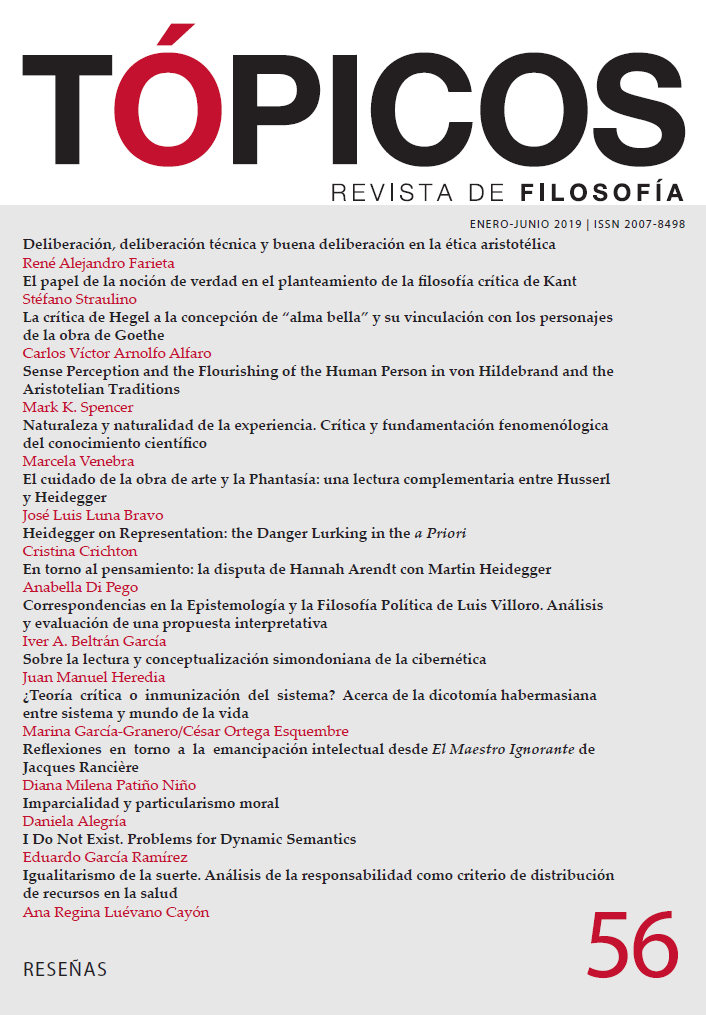Artículos
El papel de la noción de verdad en el planteamiento de la filosofía crítica de Kant
Publicado 2018-12-13
Palabras clave
- Kant,
- Kant precrítico,
- objeto,
- lógica trascendental,
- verdad
- criterio de verdad ...Más
Cómo citar
Straulino, S. (2018). El papel de la noción de verdad en el planteamiento de la filosofía crítica de Kant. Tópicos, Revista De Filosofía, 56, 49-74. https://doi.org/10.21555/top.v0i56.954
Resumen
La discusión en torno a la teoría kantiana de la verdad suele girar alrededor de las preguntas —íntimamente relacionadas entre sí— por la adscripción de Kant a una versión coherentista o correspondentista de la verdad y por los correspondientes criterios de verdad. Estas discusiones suelen ponderar qué teoría de la verdad resulta más adecuada dados ya los principios críticos. En contraste con esto, este trabajo pretende mostrar, a través de la evolución de la noción de verdad del Kant precrítico y del proyecto de una lógica trascendental, la vinculación intrínseca de la noción de verdad con los principios mismos de la filosofía crítica, y replantear las preguntas por la definición y el criterio de verdad en el marco de la pregunta por la posibilidad de la verdad.Referencias
- Alves, P. M. S. (2008). The Concept of a Transcendental Logic. En V. Rohden, R. R. Terra, G. A. de Almeida, & M. Ruffing (eds.) Recht und Frieden in der Philosophie Kants: Akten des X. Internationalen Kant-Kongresses. Vol. 5 (113–125). Berlin: Walter de Gruyter.
- Barone, F. (1999). Logica formale e logica trascendentale. 1 Da Leibniz a Kant. Milano: Edizioni Unicopli.
- Beiser, F. C. (1992). Kant’s Intellectual Development: 1746-1781. En P. Guyer (ed.) The Cambridge Companion to Kant. (26–61). Cambridge: Cambridge University Press.
- Capozzi, M. (2002). Kant e la logica (Vol. 1). Napoli: Bibliopolis.
- Cicovacki, P. (1995). Kant on the Nature of Truth. En H. Robinson (ed.) Proceedings of the Eight International Kant Congress. Vol. II, 1 (199–205). Milwaukee: Marquette University Press.
- Esterhuyse, W. P. (1972). From Plato to Kant: The Problem of Truth. En L. W. Beck (ed.) Proceedings of the Third International Kant Congress. (281–287). Dordrecht-Holland: D. Reidel Publishing Company.
- Ewing, A. C. (1961). Idealism. A Critical Survey. Strand W.C: Methuen.
- Hanna, R. (2000). Kant, Truth and Human Nature. British Journal for the History of Philosophy, 8, 225–250.
- Hofmeister, H. E. M. (1972). The Problem of Truth in the “Critique of Pure Reason”. En L. W. Beck (ed.) Proceedings of the Third International Kant Congress. (316–321). Dordrecht-Holland: D. Reidel Publishing Company.
- Hume, D. (1970). Enquiries Concerning the Human Understanding and Concerning the Principles of Morals. L. A. Selby-Bigge (ed.) Oxford: Clarendon Press.
- Kant, I. (1900). Gesammelte Schriften. Preussische Akademie der Wissenschaften-Deutsche Akademie der Wissenschaften zu Berlin-Akademie der Wissenschaften zu Göttingen (eds.) Berlin-Leipzig : Georg Reimer-Walter de Gruyter & Co.
- ----(2009). Crítica de la razón pura. M. Caimi (trad.) México: Fondo de Cultura Económica.
- Kemp Smith, N. (1923). A Commentary to Kant’s Critique of Pure Reason. London: Macmillan.
- Leibniz, G. W. (1965). Die philosophischen Schriften. C. I. Gerhardt (ed.) Hildesheim: Olms.
- Nenon, T. J. (1986). Objektivität und endliche Erkenntnis. Kants transzendentalphilosophische Korrespondenztheorie der Wahrheit. Freiburg: Alber.
- ----(1994). Limitations of a Coherence Theory of Truth in Kant’s Critical Philosophy. International Studies in Philosophy, 26(2), 33–50.
- Nussbaum, C. (1992). Critical and Pre-Critical Phases in Kant’s Philosophy of Logic. Kant-Studien, 83, 280–293.
- Paek, C.-H. (2005). Kant’s Theory of Transcendental Truth as Ontology. Kant-Studien, 96, 147–160.
- Palacios, J. M. (2013). El idealismo trascendental: Teoría de la verdad (2a ed. revisada). Madrid: Avarigani Editores.
- Perin, A. (2010). A verdade como um problema fundamental em Kant. Trans/Form/Ação, 33(1), 97–124.
- Prauss, G. (1969). Zum Wahrheitsproblem bei Kant. Kant-Studien, 60, 166–182.
- Rescher, N. (1982). The Coherence Theory of Truth. Washington: University Press of America.
- Rosales, A. (2000). Sein und Subjektivität bei Kant. Zum subjektiven Ursprung der Kategorien. Berlin: Walter de Gruyter.
- Rosenkoetter, T. (2009). Truth Criteria and the Very Project of a Transcendental Logic. Archiv für Geschichte der Philosophie, 91, 193–236.
- Scheffer, T. (1993). Kants Kriterium der Wahrheit. Anschauungsformen und Kategorien a priori in der “Kritik der reinen Vernunft”. Berlin: Walter de Gruyter.
- Schulz, G. (1993). Veritas est adaequatio intellectus et rei. Untersuchungen zur Wahrheitslehre des Thomas von Aquin und zur Kritik Kants an einem überlieferten Wahrheitsbegriff. Leiden: E.J. Brill.
- Sleigh, R. (1982). Truth and Sufficient Reason in the Philosophy of Leibniz. En M. Hooker (ed.) Leibniz: Critical and Interpretive Essays. (209–242). Manchester: Manchester University Press.
- Straulino, S. (2016). La noción kantiana de verdad trascendental. Revista de Estudios Kantianos, 1(2), 126–145.
- ----(2018). La pregunta por la verdad en la lógica trascendental de Kant. Estudios, 124, 37–55.
- Tolley, C. (2012). The Generality of Kant’s Transcendental Logic. Journal of the History of Philosophy, 50, 417–446.
- Underwood, L. J. (2003). Kant’s Correspondence Theory of Truth. New York: Peter Lang Publishing Inc.
- Vanzo, A. (2010). Kant on the Nominal Definition of Truth. Kant-Studien, 101, 147–166.
- Vázquez Lobeiras, M. J. (2001). Kann man Kants transzendentale Logik “besondere Logik” nennen? En V. Gerhardt, R.-P. Horstmann, & Schumacher (eds.) Kant und die Berliner Aufklärung. Akten des IX. Internationalen Kant-Kongresses. Vol. 5, (106–113). Berlin: Walter de Gruyter.
- Walker, R. C. S. (1989). The Coherence Theory of Truth. Realism, Anti-Realism, Idealism. London-New York: Routledge.
- Wolenski, J. (1994). Contributions to the History of the Classical Truth-Definition. Logic, Methodology and Philosophy of Science, 9, 481–495.







